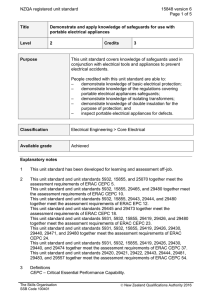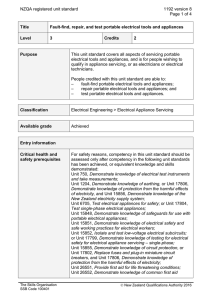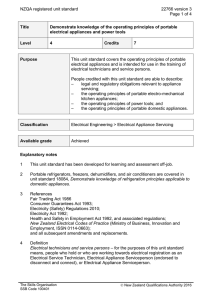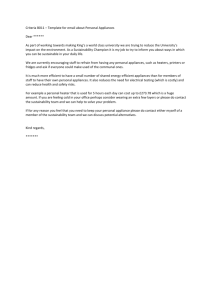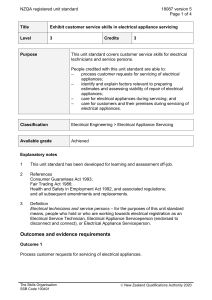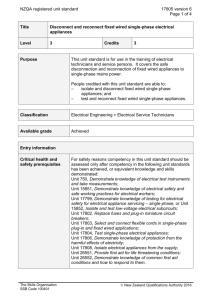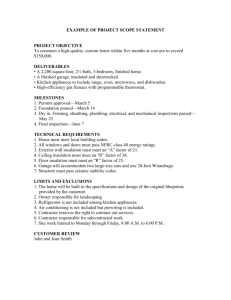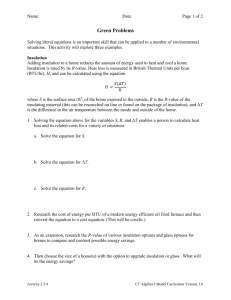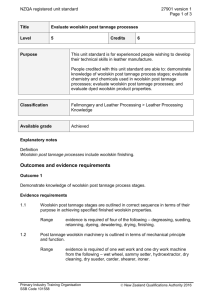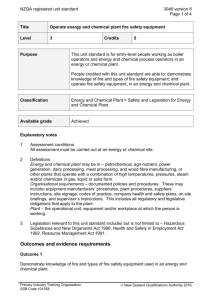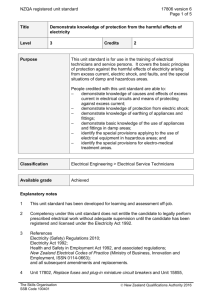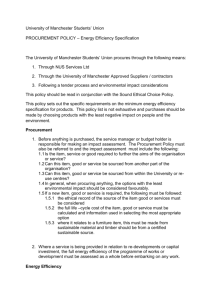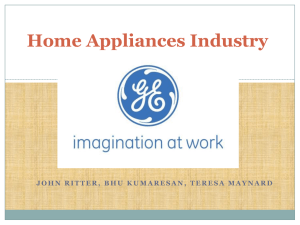15848 Demonstrate knowledge of safeguards for use with
advertisement
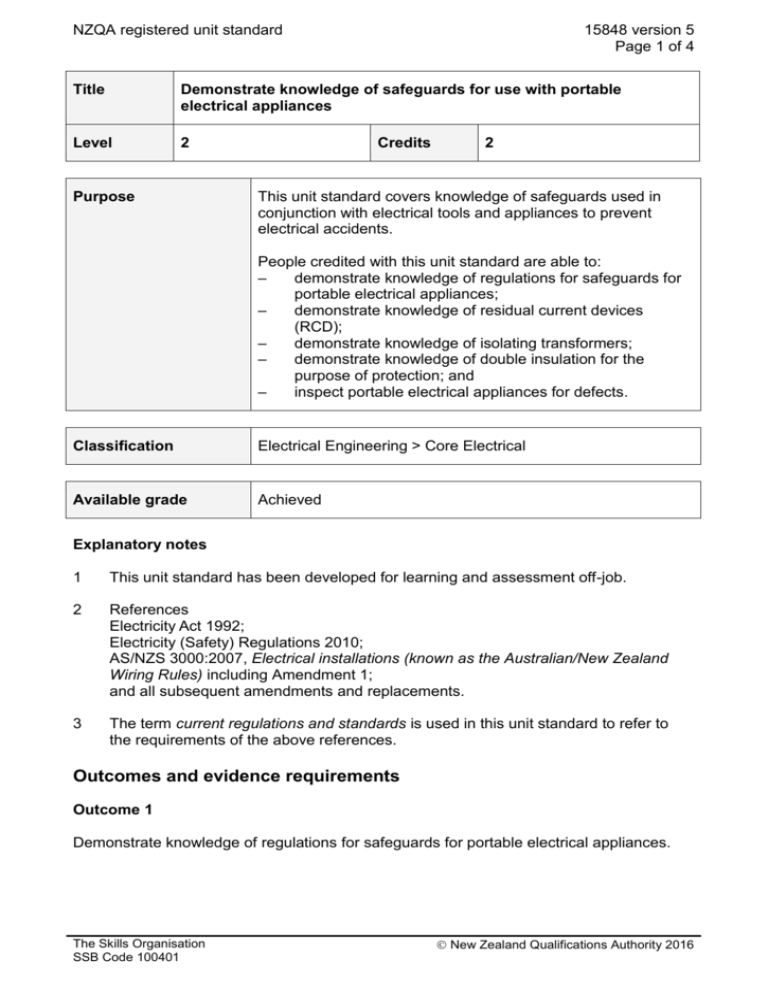
NZQA registered unit standard 15848 version 5 Page 1 of 4 Title Demonstrate knowledge of safeguards for use with portable electrical appliances Level 2 Purpose Credits 2 This unit standard covers knowledge of safeguards used in conjunction with electrical tools and appliances to prevent electrical accidents. People credited with this unit standard are able to: – demonstrate knowledge of regulations for safeguards for portable electrical appliances; – demonstrate knowledge of residual current devices (RCD); – demonstrate knowledge of isolating transformers; – demonstrate knowledge of double insulation for the purpose of protection; and – inspect portable electrical appliances for defects. Classification Electrical Engineering > Core Electrical Available grade Achieved Explanatory notes 1 This unit standard has been developed for learning and assessment off-job. 2 References Electricity Act 1992; Electricity (Safety) Regulations 2010; AS/NZS 3000:2007, Electrical installations (known as the Australian/New Zealand Wiring Rules) including Amendment 1; and all subsequent amendments and replacements. 3 The term current regulations and standards is used in this unit standard to refer to the requirements of the above references. Outcomes and evidence requirements Outcome 1 Demonstrate knowledge of regulations for safeguards for portable electrical appliances. The Skills Organisation SSB Code 100401 New Zealand Qualifications Authority 2016 NZQA registered unit standard 15848 version 5 Page 2 of 4 Evidence requirements 1.1 Situations requiring safeguards are described according to current regulations and standards. 1.2 The type of safeguards that may be used for each situation are identified according to current regulations and standards. Outcome 2 Demonstrate knowledge of residual current devices (RCD). Evidence requirements 2.1 The principles of operation are described in terms of the construction of the device and how it can prevent electric shock. 2.2 The maximum allowable operating time and residual current for personal protection are stated according to current regulations and standards. 2.3 The advantages of RCDs compared to fuses and circuit breakers are explained in terms of protection from electric shock. 2.4 The need for, and the nature of, regular testing is explained according to current regulations and standards and industry practice. Outcome 3 Demonstrate knowledge of isolating transformers. Evidence requirements 3.1 The construction and operation of an isolating transformer is described with reference to its component parts. 3.2 The manner in which an isolating transformer protects people from electric shock is described in terms of electric current path through the body. 3.3 Test requirements for isolating transformers are stated in accordance with current regulations and standards. 3.4 Conditions for safe use of isolating transformers are explained in accordance with industry practice. Range one appliance for maximum safety, interconnection of earth conductors when used with multiple appliances, use of other safeguards in conjunction with isolating transformer. Outcome 4 Demonstrate knowledge of double insulation for the purpose of protection. The Skills Organisation SSB Code 100401 New Zealand Qualifications Authority 2016 NZQA registered unit standard 15848 version 5 Page 3 of 4 Evidence requirements 4.1 Double insulation of an appliance is described in terms of what it is and how it protects the user from electric shock. 4.2 The symbol for double insulation is recognised from appliance nameplate or graphical representation. 4.3 Typical uses of double insulation are stated. Range portable tools, domestic appliances, extension leads. 4.4 Essential differences between an earthed appliance and a double insulated appliance are stated according to industry practice. 4.5 Reasons as to why exposed metalwork must not be connected to earth are given in accordance with safety principles. Outcome 5 Inspect portable electrical appliances for defects. Range at least three of – portable power tool, extension cord, home or office appliance. Evidence requirements 5.1 Inspection includes visual check of appliance and cord for defects. Range appliance defects – missing screws, handles, guards, controls; cracked body or hand grips, damaged chucks, blade clamps, tool holders, cord grips; cord defects – cuts, nicks, abrasions, tightly twisted or knotted, flattened, compressed, plug top incomplete, plug not securely fitted to cord. 5.2 Operation of appliance verifies that it works as intended. 5.3 Defective appliances are labelled and put aside for repair by a competent person. Replacement information This unit standard replaced unit standard 1183. Planned review date 31 December 2014 The Skills Organisation SSB Code 100401 New Zealand Qualifications Authority 2016 NZQA registered unit standard 15848 version 5 Page 4 of 4 Status information and last date for assessment for superseded versions Process Version Date Last Date for Assessment Registration 1 10 February 1999 31 December 2013 Revision 2 3 April 2001 31 December 2013 Review 3 26 May 2005 N/A Rollover and Revision 4 15 March 2012 N/A Revision 5 15 January 2014 N/A Consent and Moderation Requirements (CMR) reference 0003 This CMR can be accessed at http://www.nzqa.govt.nz/framework/search/index.do. Please note Providers must be granted consent to assess against standards (accredited) by NZQA, before they can report credits from assessment against unit standards or deliver courses of study leading to that assessment. Industry Training Organisations must be granted consent to assess against standards by NZQA before they can register credits from assessment against unit standards. Providers and Industry Training Organisations, which have been granted consent and which are assessing against unit standards must engage with the moderation system that applies to those standards. Requirements for consent to assess and an outline of the moderation system that applies to this standard are outlined in the Consent and Moderation Requirements (CMR). The CMR also includes useful information about special requirements for organisations wishing to develop education and training programmes, such as minimum qualifications for tutors and assessors, and special resource requirements. Comments on this unit standard Please contact The Skills Organisation reviewcomments@skills.org.nz if you wish to suggest changes to the content of this unit standard. The Skills Organisation SSB Code 100401 New Zealand Qualifications Authority 2016
